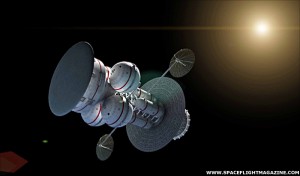Existential Futurology (A Few Thoughts on the Unlikelihood of Interstellar Colonization)
According to various estimates, including a mathematical model published a couple years ago by Thomas W. Hair and Andrew D. Hedman, the galaxy (let’s limit ourselves to our galaxy for purposes of discussion) should already have long been colonized by a spacefaring civilization. That our solar system appears to be untouched can only mean (according to such models, and ignoring UFOs as possibly representing an ET presence) that we are alone in the universe, that we happen to be in some undiscovered backwater, or that our planet/star system was in some other respect undesirable for colonization by ETs that long preceded our arrival on the scene.
 But there is another possibility that I think is much more likely: that “colonization,” the perpetual expansion in search of resources and Lebensraum—literally “living room,” space to spread out and flourish—may not be a relevant motive for advanced intelligences beyond a certain technological and social threshold. The relevant threshold I’m thinking of is specifically that of immortality.
But there is another possibility that I think is much more likely: that “colonization,” the perpetual expansion in search of resources and Lebensraum—literally “living room,” space to spread out and flourish—may not be a relevant motive for advanced intelligences beyond a certain technological and social threshold. The relevant threshold I’m thinking of is specifically that of immortality.
To see why immortal extraterrestrials might never embark on galactic colonization, let’s project forward into our own future and see why we ourselves might not take such a path.
World Enough and Time
We are right on the cusp of being a spacefaring species, but space technology is proceeding in parallel with technological advances in health and bioengineering. We are within a century of technological breakthroughs that will greatly if not indefinitely extend the lifespan of human consciousness, via significant biomechanical augmentation of the brain’s support systems if not the actual “uploading” of our minds to computer substrates (which I’m personally skeptical of, but that’s another topic).
Dmitri Itskov, for instance, predicts immortality will be achievable by 2045—about the time Ray Kurzweil predicts his “singularity.” I suspect it will take longer, especially for such technology to trickle down to the masses, but such developments are probably nevertheless inevitable. We should remember that even a “significant advance” in longevity during present lifetimes could be the tipping point, because then people will, as Kurzweil puts it, “live long enough to live forever”—that is, live long enough to take advantage of further advances and then further ones beyond that, bootstrapping ourselves to immortality.
More than even robotics, AI, and big data, immortality will be the biggest game changer for how our descendants inhabit and utilize space—and not in the way Malthusians would suppose. While longevity will for a while continue to contribute to increased population growth (because old people would not die and make way for new people as quickly), it would ultimately also change social values about the family. If our offspring cease to be the only way we can live on, then will having children be as strong an imperative? Will “be fruitful and multiply” continue to be a social imperative for our species?
I suggest it wouldn’t. We should not assume that the “joys of parenthood and family life” are eternal; the Catholic Church notwithstanding, these imperatives belong to the regime of “the selfish gene,” which a technological singularity would enable our descendents to transcend, freeing us for other projects and ambitions that may prove far more rewarding than the hassles of pregnancy, childbirth, and caring for toddlers. The imperative of reproduction is likely to dwindle and may even wither altogether; at best, it will slow to a glacial pace. Certainly, we can imagine “selfish memes” taking the place of selfish genes, but the perpetual cycle of death and reproduction of space- and resource-utilizing meat substrates for those memes would not be part of that picture.
Expansion of habitats, putting pressure on an environment in terms of resources and space, characterizes biological species driven by a reproductive imperative and economics of scarcity, and this is the mindset that imagines us needing and wanting to venture out into space. But I suspect immortality (coupled with new energy sources on our own doorstep) will put an end to the need for ever-expanding Lebensraum before humans get very far beyond our own solar system, if even that far.
The Death of Heroism
It is kind of counterintuitive, but the longer our potential lives are, the more fearful death becomes, not less. Life in the past was relatively cheaper—people died sooner, were sure of death’s inevitability and believed in an afterlife, and were thus willing to take more risks like setting sail in ships for distant shores where the transit was perilous and the outcome uncertain. By contrast, if a person has a potential lifespan that is indefinite, with the whole of history ahead of them to experience and enjoy, will they risk that by putting themselves in any kind of harm’s way? I suspect immortality will put a damper on our species ‘extroversion’ by reducing the personal risks individual beings are likely to subject themselves to.
Remember, future humans will have gotten where they are through science, and the ideology of science is materialism. The materialist view is that the mind is nothing but a function or at least an epiphenomenon of the central nervous system, and thus this organ, the brain, will be the focus of life-preservation and belief in the afterlife will continue to diminish. This is already happening. More and more people, including nonscientists, are coming to believe that “this is all there is,” and the mind, our consciousness, all that we are and were, begins and ends with our brains. (I don’t agree with this, but I am not that optimistic that materialism will be supplanted by a spiritually higher, less death-afraid philosophy.)
You can’t replace a brain and have continuity of consciousness (in the materialist view), thus no amount of “copying” will substitute for this holy grail of immortality—preservation of brain function. Thus a potentially perilous journey across space would, for immortals, seem like not worth the risk. I suspect that our descendants will be the sorts of creatures who are afraid to cross the street and or go out their front doors (not that there will be streets or front doors), let alone make journeys into space. They will not see any point in risking their precious continuity of consciousness—whether that consciousness has an organic substrate or (as some transhumanists imagine) a machine one. Even in an armored, weaponized mecha body, this “center” of consciousness will remain vulnerable to loss through accident.
But in any case, why should they venture outward, when technology will wildly enhance their ability to journey, as it were, inward? We should remember: We are not talking about prolonging old age, but of prolonging and enhancing (healthy) existence in a rewarding, magical (in the Arthur C. Clarke sense: beyond-high-tech) world. Chemical and mechanical intervention will cure boredom and give that existence potentially endless new rewards and purposes. Those rewards and purposes could be base and hedonistic—what I think of as the H.R. Giger lotus-eating path to transhumanity—or they could be noble.
In a more optimistic scenario, the richness of future existence could be linked precisely to the project of robotic knowledge gathering I discussed in the previous post. The more worlds and lives brought back and simulated for virtual experience and learning, the more possibilities there would be not only for “entertainment” but also for growth and advancement.
The Future of “Authentic Experience”
We generally still devalue simulations and living life by proxy, as we maintain ancient philosophical distinctions about authentic versus inauthentic experience. What does it really mean to “experience something directly”? We conceptualize “direct” as near in space and time. Fundamental to our picture of experience is presence, being there. Presence has always been rooted in the organic body so we don’t yet know how to think of it otherwise. But technology is already altering and challenging the definitions of the body, and it will ultimately transform our sense of (and ideas about) presence and the authenticity of our experience.
Authentic contact is a kind of participatory magic. What it really boils down to is just sensory richness. The inadequacy and shallowness of current virtual reality is simply its smallness, incompleteness, narrowness, lack of resolution, few sensory channels, etc. Although we are experiencing bold leaps in this technology right now, our senses are still concentrated in our heads and our effectors are in our body, and augmentation of both is still relatively primitive and limited. We still engage virtually via small mediating devices that are middlemen to the experience—seeing a representation on a small screen, typing or manipulating a controller with our hands, and so on.
But as our senses become machine-augmented and technology enables communication of words, images, sounds, and ultimately tastes, smells, and touch, and even thoughts, “direct experience” won’t require these technical middlemen to sensory experience and action at a distance. The very meaning of “being there” will change.
Imagine you have an eye stalk, like a proper alien. Then imagine that eye is mechanical, like a drone, and replacing the stalk part with wi-fi. The eye can be “part of you” but float freely, even travel to another house or another city, and it is still transmitting direct to your brain. Then imagine many such eyes, and ears, and hands and sex organs to go with them. This kind of physical and perceptual dispersal will redefine our notion of our bodies. Light will be the new blood, and the new nervous system. It will significantly rewire our brains—indeed our brains will require continual rewiring to accommodate our radical physical updating.
In the future, our ability to not only perceive but also interact at a distance will be so integral to our experience that we will seem and feel ourselves to be less localized in space. In an increasingly postbiological and machine-integrated world, there will ultimately be no need to go anywhere. When a human living on Earth is able to fully “plug in” to a rich sensory proxy, for instance stride about (or hover) on Mars in a viewing, sensing robot, interacting with the environment richly, won’t this weaken our need or desire to go there in the flesh? It is easy to imagine that “in the flesh” will go the way of flesh itself: It will come to seem, ultimately, in a century or two, like something archaic or superstitious.
Nowhere Men
The liabilities of humans’ current format extend beyond our fragile, evanescent organic bodies and limited cognitive processing to include the very notion of “self,” which mystics of all traditions counsel is an illusion and the very source of our suffering. It seems likely that minds liberated from current physical constraints will also seek liberation from mental suffering and thus abdication of narrow self-views, and that technology will help in this.
It will be possible and presumably desirable to share our experiences directly, such that one person can sense on behalf of another distant person. I may be able to plug into your sense organs (if you let me) and you may be able to plug into mine (if I let you). With the radical possibilities opened up by replacing the physical body with endlessly modifiable polymorphous and spatially dispersed sensors and effectors that may be shared, not only our sense of “the body” but also our sense of individuality will be radically transformed. It may be that “the individual” goes away entirely.
And consider what possibilities open up when those roving eyes and ears and hands spread out across the universe. Imagine what rich simulations could be created from the data gathered by swarms of self-replicating probes doing “deep” science on every planet across the galaxy and beyond.
Consider this: Advanced immortal “gods” might even choose to play a game like giving up self-awareness temporarily, as in a dream, and experiencing the entire life of an animal or a being from a distant world, living out its existence in a rich simulation, and then experience the thrill of “waking up” from that life when the creature’s body dies, finding yourself back home, wherever home is. Given infinite time, you could do this indefinitely. (Michio Kaku suggests that the finite age of the universe will be no limit—as we approach the end of this one, we will just build new universes to escape into.)
If this sounds like Lila, the “God Game” of the Vedic scriptures, well, it is. It has already been suggested that we are beings living in a simulation. Another possibility is that we are already much more advanced beings who have forgotten that fact temporarily in order to feel what it is like to be human—that is, we are living in our own simulation. If that’s the case, and in the future we create and inhabit further simulations, then … well, it gets dizzying—simulations within simulations, gods within gods within gods, like turtles all the way down.
Approaching Rivendell
This picture, of cognitively hypertrophied, cowardly future beings turning inward into virtual worlds and simulations and exploring the universe by proxy sounds like a lot of dystopian science fiction, such as the Talosians in the Star Trek pilot episode “The Cage.” But to me it more closely resembles the immortal elven races in Tolkien’s Lord of the Rings.
Tolkien thought of his trilogy as a sort of thought experiment about immortality—what would happen in a world without death? It’s not an altogether bad picture. There’s nothing hedonistic and decadent about his elven race—indeed, they represent the highest civilization and progressive ideals, creating poetry and art and music of exquisite beauty. Yet by and large they are not heroic. They are reluctant, except when pressed, to leave their magic- (which of course equals high-technology-) protected enclaves or intervene in the history of the mortal races, beyond offering guidance and boons as necessary. As caretakers or custodians of Middle Earth, they are relatively hands-off, preferring to let mortals act in their stead.
Sometimes you will hear the argument that future humans will get bored with immortality and eschew it—and in fact, this was part of Tolkien’s thought experiment too: A few Elves here and there are bored and willing to trade their immortality for a mortal life, out of interracial love for instance. But these are the exceptions. I suspect it will be exceptional, too, for increasingly materialistic post-humans who believe or assume that their minds and selves are bound inextricably to their physical bodies and that there is nothing else awaiting them in some afterlife. They may suspect at times that they are gods who have forgotten that state, but how can they be sure? I suppose some advanced immortals may get bored with such a life and opt out, but as a species or civilization we will most certainly opt in and take whatever cyborg leaps that that entails.
My guess is that technological species elsewhere that survive their aggressive nuclear phase will colonize and exploit their own solar systems, but that by the time their technology enables fast space travel, it will tend to be their machine proxies—their remote sensing and interacting probes—that propogate through the universe on their behalf. They won’t need new homes for an expanding biological population—families homesteading on new worlds, etc., in a picture resembling our own colonial memory. They will have created a heaven right where they are, their experience ever-enriched by the knowledge their machines harvest from the remotest reaches of space and time.
—




In this article it mentions the possibility of achieving immortality by 2045 (or longer based on the comment from this article’s author). Well unless this breakthrough prevents death caused by accident or other unforseen events, there will never be immortality just an extension of life well beyond the current life expectancy.